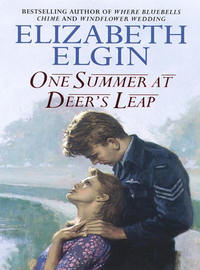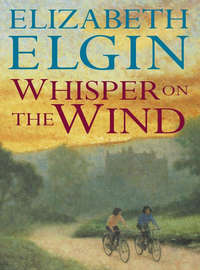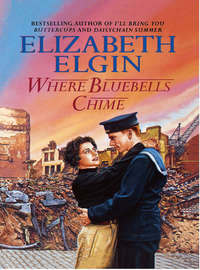
Полная версия
Daisychain Summer
‘Come out. Come out slow …’ he hissed.
There was a rustling and a voice said, ‘All right, mister.’ Two hands appeared in a gesture of surrender, then a face; white, thin, full of fear.
‘Out here …’ Tom took a few steps backward. The man straightened himself.
‘Don’t shoot, sir?’
‘I won’t. It isn’t loaded.’ Tom lowered his gun. He didn’t need to threaten. He could take the man with one hand behind his back. Skin and bone, he was. ‘After game, were you? This is private land!’
‘Not birds, sir. Had a couple of snares down, for a rabbit …’
‘Got bairns, have you?’ Poor devil. A square meal – one like Alice cooked – would send his stomach into cramps, by the look of him.
‘One little lad. At home, with the wife.’
‘And where is home?’
‘Near Camborne – Cornwall. She’s with her mother. Had to leave her there. No work, see.’
‘So you’re tramping – looking for a job?’
‘That’s it. But who’ll employ a man with a badly foot? I was a keeper myself before the war, but who wants a lame keeper? You should know the walking that’s got to be done.’
Tom knew – especially now. He’d been wondering about another keeper, he thought wryly, and one had popped out of the bushes in front of him, though one who’d be little use to anybody!
‘I know,’ he said. ‘And what’s to do with you, then?’
‘Wounded in the war. My foot. Two toes gone. Makes it awkward, when it comes to walking.’
‘Then how come you’re damn-near starving? What about your pension? The Army gives pensions to badly wounded men.’
‘Pension? You don’t get one of them when it was your own doing – or so they said!’
‘And did you? Did you shoot yourself?’ It hadn’t been uncommon. Driven to desperation, some soldiers had put a round into their own foot; an easy way out of the Army – a ticket to civvy street.
‘Did I hell! We went over the top, one night. I tripped and my rifle went off. Did you ever know what it was like, out there in No Man’s Land?’
‘I knew,’ Tom said grimly. ‘I was a marksman.’
‘And so was I. Like I told you, I was a keeper, and I know how to shoot, mister. If I’d had a go at my own foot I’d have made a tidier job of it than that!’ He stuck out his right boot. The front of it had been hacked away to accommodate the distortion of flesh and bone. ‘So they wouldn’t give me a pension. Told me I was lucky I wasn’t being put on a charge with a firing squad at the end of it.
‘My wife goes out scrubbing. She goes without so the boy can eat. If I had a loaded gun now, it wouldn’t be my foot I’d aim it at!’
‘That’s enough!’ Tom rapped. ‘You’re alive, man! Think back to how it was, and be grateful. There’s many a one who’d be glad to be as hungry and alive as you!’
‘Aye. Then more’s the pity I wasn’t one of them,’ he said without self-pity. ‘I’d be a hero, now, with a tidy gravestone to show for it – and my Polly with a widow’s pension.’
‘Sit you down, man. You don’t have to make excuses to me. How bad is that foot? In pain, are you?’
‘Sometimes. It’s my balance, though. I have to walk on my heel. Bairns make fun of me and you don’t get any help – not a penny parish relief – when your discharge papers say you shot yourself in the foot. A coward, that makes me, and I’ll swear on my son’s life it was an accident.’
‘How old is he?’ Tom was still remembering Daisy’s smile.
‘Just gone three, though I haven’t seen him for six months. Don’t know how it is with him and Polly – no fixed address, as they say, for them to write to. But you believe me, don’t you, sir?’
‘I believe you.’ He did – and besides, what right did a deserter have to stand in judgement on any man? ‘But you’re a long way from your wife and child – how come you ended up here? You’ll not find work in these parts, either.’
‘Maybe not. But I was billeted here, in the war, for six months. All of the summer of ’fifteen. A grand time it was, and the war something that was happening to the other poor sods – not to me.
‘The Army took over Windrush Hall as a billet. Polly was in service, then, ’bout two miles away. That was when I met her. When I knew I was going to the Front we got married and she went back home, to Cornwall. Her father was badly. She helped her mother to nurse him, though he died …
‘But that time around these parts were the best months of my life. I knew this estate and the big house, too, like the back of my own hand. Can’t blame me, I suppose, for making my way back.’
‘No, though the army left a right old mess behind them when they moved out. Windrush had gone to rack and ruin and as for these woods – nothing but a wilderness and not a game bird in them. I came here about eighteen months ago; been trying to lick things into shape, ever since. Reckon we’ll have some decent sport, though, come October.’
‘Aye, sir. And you’ll not turn me over to the constable? I’ll be off your land as soon as maybe if you’ll turn a blind eye to the snares.’
‘Did you catch anything?’
‘A rabbit. It’s in the bush, yonder. I’d aimed to light a fire, tonight – cook it. That was one thing you learned in the army. You were never stuck fast to find a way to cook a rabbit.’
‘Nor a chicken,’ Tom grinned. ‘But look over there.’ He pointed to the church tower. ‘Over to the right – that clump of oaks. There’s a hut, beside them. You can kip there.’
It was a keeper’s hut, usually to be found near the rearing field but moved away, now the chicks were grown, to the edge of the estate. On small, iron wheels with a tin roof, it was snug and dry with a stove inside it and a kettle and pan. A fine place for a keeper to shelter in on cold, wet nights when a poacher might be forgiven for thinking the weather was on his side.
‘I know it – remember it from way back.’
‘Then you’ll know there’s a little iron stove in there. Find yourself some dry wood, and light a fire. You can cook your rabbit on it. There’s matches on the ledge over the door, and water in the beck, nearby.’
‘How will I get in?’ he demanded, eagerly.
‘About twenty yards from the door you’ll see some stones. The key is under the big one …’
‘I’ll find it – and I’ll not take liberties. I’ll leave it tidy.’
‘You better had! And there’s no hurry, for a couple of nights. If anyone finds you there, tell them Dwerryhouse said it’s all right.’
‘I will, and thank you, sir. God bless you, and yours.’
‘Aaar. Be off with you,’ Tom grated, embarrassed. ‘And here – catch!’ he called to the limping man, throwing his packet of sandwiches. ‘Have these. You need them more than I do. And by the way – got a name, have you?’
‘Purvis, sir. Dickon Purvis …’
Tom turned abruptly, striding angrily away. It should not have been like this – a decent man begging, his wife and bairn miles away. And when he’d see them again, only God knew. Nothing but skin and bone, poor devil. He’d never see another winter through, in his condition. What would become of his wife, then? And what about the little lad; what if it had been Tom Dwerryhouse with a badly foot and Alice and Daisy miles away and living on charity and Alice taking in sewing, like as not, to help ends meet?
‘Come on!’ he snapped at his dogs, though they had never left his heels all morning. ‘Home!’
He took a deep, steadying breath. Alice would cut him more sandwiches and besides, he needed to see her, tell her about the man. Alice would listen, understand his anger, and happen Daisy would smile for him again.
And that lot had better not start another war! They’d never get him into a uniform again, if they did; not if they begged him on bended knees and offered him a cushy billet for the duration.
Then he stopped his rantings, and thought on. They would never get him. How could you call a man to the colours who’d been killed at a place called Epernay; wiped out with eleven others on a March morning, more than two years ago?
‘Alice!’ he called, breaking into a run. He needed to touch her, hold her, pour out his bitterness. At his garden gate, he paused. The big black, shiny pram stood there, with Morgan asleep beside it, head on paws. It would be all right. Alice would know what to say to ease his conscience.
She heard the snapping of the sneck as he opened the gate and came, smiling, to stand on the doorstep.
‘Hullo, love,’ she said softly and all at once his world was sane and safe again.
‘Put the kettle on, lass, and make us a sandwich, eh?’
‘But I cut you some, this morning. Didn’t you think on to take them?’
‘I did, love, only – oh, come on inside, and I’ll tell you …’
‘Well, now.’ Julia checked that the compartment door was properly closed, then settled Drew beside the window. ‘That wasn’t as awful as you thought, now was it?’
‘I wasn’t entirely looking forward to it,’ Helen admitted, ‘but Mr Carver was very understanding, and the young one seems efficient enough, though he asked a lot of questions.’
‘Officious, more like.’ Julia had not liked Carver-the-young. His manner had been patronizing; he didn’t like doing business with women, and it showed.
‘Neither could see any difficulty. We might not even have to go to court, if everything works out as it should. And I suppose it’s only right they should want to meet Alice and have a talk with her. After all, we might be domineering in-laws, bullying her into giving up her son.’
‘Gracious, mother – they know we aren’t like that! It will all go through smoothly.’
‘I hope so. And do keep hold of Drew. He mustn’t stand on the seat.’
‘Sit down, you little horror!’ Julia ordered. ‘But you’ve got to admit he was very good at the solicitors,’ she defended. ‘We’ll have a good run on the lawn before bedtime – tire him out,’ she smiled.
‘Play cricket,’ he demanded, then turned his attention again to the window and the fields and animals slipping past it.
‘He’s a good little soul,’ Julia smiled, fondly. ‘He ought to have someone his own age to play with.’
‘A sister, you mean? But he has one, and when Alice visits they’ll have the time of their young lives.’
‘But Alice will be with us quite soon – especially now that the Carvers want to see her. Daisy will hardly be big enough to have a rough and tumble with Drew.’
‘Perhaps not just yet – but Alice will come to see us often, I hope. And when they are both old enough to understand, we shall tell them they are –’ She left the sentence in mid-air.’
‘We’ll have to be careful,’ Julia frowned. ‘But the sooner they know, the better. It would be awful if they were never told, then fell in love.’
‘Julia!’ Helen laughed. ‘That kind of thing only happens in storybooks – not in real life. And even if you and I were determined they should never know, there would be some busybody think it their duty to tell them.’
It was Helen’s turn, now, to reassure her daughter. And soon, Drew would be theirs entirely and Alice would visit often. She had loved Alice deeply; would ever be grateful for Drew – for the little boy who laughed with delight as the engine driver let go three important hoots at the approaches to Holdenby station.
‘He does so love trains. I suppose he’ll want to drive an engine, when he grows up.’
‘Most small boys do, mother. But Drew will grow up to care for Rowangarth and those who work for it – and Shillong, too. And to make a happy marriage, I hope, and have sons.’
‘He isn’t two, yet.’ Helen put out a protective arm as the train began its slowing in a series of small jerks. ‘And at nearly two, hardly anything is more important than a ride on a train. This has been a good day, hasn’t it?’ She looked for her handbag, gathered the parcels from the seat beside her. ‘And there is Will, in the yard.’
Will, thought Julia; waiting with the carriage and pair. They really ought to have a motor. It was so unlike her mother to forbid one to her. Everyone had motors, these days. Why must Julia MacMalcolm not be permitted to drive?
‘Come on, young Sutton!’ She scooped Drew into her arms. ‘Say goodbye to the train.’ And why shouldn’t she drive? Why, just because Pa had been killed in a driving accident, should motors be taboo at Rowangarth? ‘And come and say hullo to the horses.’
Their homecoming was robbed of its usual pleasure. Immediately she saw the expression on the face of the housekeeper who waited at the top of the stone steps, Julia knew that something was wrong.
‘Milady – this came, two hours ago. I took the liberty of ringing the solicitors, but they said you had left and didn’t know which train you’d be coming back on.’
Julia held out her hand for the small, yellow envelope that could still send fear tearing through her, even though the war was long over. Tight-lipped, she ripped open the telegram.
‘It’s signed Bossart. That’s the name of the farmer Aunt Sutton stays with. Mlle Sutton injured. Please come with haste. What’s happened, mother?’
‘Injured. A motor!’
‘No. She rarely drove, in France. Doesn’t like the wrong side of the road. Probably an accident horse-riding.’
‘Then the best way to find out is to go at once. I can get the overnight train to London. With luck, I could be with her by tomorrow evening.’ Helen frowned. Her fear was real, her distress obvious.
‘Mother – first have a cup of tea, then we’ll talk,’ Julia soothed. ‘Take a deep breath. It might not be as bad as it sounds. Perhaps Monsieur Bossart was being overcautious.’
‘I shall go tonight, for all that!’
‘Then I shall come with you. Do you think we could take Drew?’
‘Certainly not! You must stay here. Anne Lavinia would want you to.’
‘Then let me at least see you safely onto the boat train?’
‘Julia! I am not quite in my dotage. I’ll manage. And let us hope you are right. Monsieur Bossart might be overreacting. I can get the last train from Holdenby and still be in good time for the York sleeper to King’s Cross. When we have had our tea, I want you to ring up York; make a reservation for me. I shall manage well enough but oh, poor Anne Lavinia.’
Aunt Sutton, to most. Her husband’s sister, Helen thought sadly. Forthright, outspoken, unmarried. A woman who cared more for horses than for most human beings. Julia had always been her favourite; Julia, so like her aunt in many ways.
Poor, poor Aunt. Julia stirred her tea thoughtfully. She had visited her doctor when in London, but this appeared to be an accident, not an illness. She wished there was some way she could be with her.
‘Mother – why don’t I go to France, instead? You could take care of Drew, then.’
‘No. I shall go.’ Her voice was firm. ‘John would wish it to be me who is with her – if it is serious, that is. And like you say, I think I shall find her not as ill as Monsieur implies. She’ll be all right. She’s a very strong-minded lady. Whatever it is, she’ll pull through!’
‘If that’s what you want. I’ll phone Reservations, then I’ll ring Pendenys. They ought to be told, and mother – why doesn’t Uncle Edward go with you? After all, he’s her brother and more nearly related than you.’
‘I agree. So stupid to forget such a thing. By all means he must come. But don’t suggest it when you ring, Julia. If he feels he should be with me, he’ll say so at once. Be tactful.
‘And now I must ask Miss Clitherow to give me a hand with my case. Don’t want to pack too much – travel as light as possible …’
God – let everything be all right? Julia lifted her eyes to the ceiling. She’s such an old love … Picking up the phone, she asked the operator for York station.
6
‘It’s Mr Edward, milady,’ Mary announced. ‘With the motor.’
‘At last!’ Already, Helen was gathering up her cape and travelling bag, eager to be away. ‘Now be sure to take good care of Drew, and yourself …’
‘I’ll be sure,’ Julia soothed, following her mother to the door at which Edward Sutton waited. ‘Don’t worry about a thing. Just have a safe journey and give my best love to Aunt Sutton, when you get there.’
She was relieved her uncle was going to France – had offered to go at once, without being asked. Now she would worry less, even though her mother was capable of making the journey alone – a considerable achievement, come to think of it, when not so very long ago a lady wouldn’t even have visited the shops alone.
‘My dear!’ Raising his hat, Edward Sutton kissed his sister-in-law’s cheek. ‘Tell me – are we going to arrive to a ticking-off, when we get there, for panicking? Shall we find it’s nothing more than a broken arm?’
‘No, uncle,’ Julia said softly, firmly. ‘I think Monsieur sent the telegram without aunt knowing. Had her injuries been slight she wouldn’t have allowed it, be sure of that. You know what a tough lady she is!’
‘Then the sooner we are there, the better!’
‘Oh!’ Helen’s eyes lit, surprised, on the young man in the back of the car. ‘Is Elliot coming, too?’
‘Elliot is summoned to London,’ Edward smiled wryly, ‘though for the life of me I don’t know why. Doubtless Clemmy has her reasons.’
‘Doubtless.’ Helen’s relief showed in her expression, her voice. ‘And I’m so grateful you’ll be with me, Edward. The journey there I could have coped with; what I might find when I get there is altogether different. Have you told Clemmy?’
‘I have. Sadly, she is not able to go with us. A previous engagement, I believe, though she would come at once should Anne Lavinia’s condition warrant it.’
‘Of course,’ Julia murmured. And please God Aunt Sutton was sitting up and taking nourishment, when they arrived. ‘Let me take your bag, mother, and get you settled in the motor. You’ll be in York in good time for the sleeper. Good evening, Elliot,’ she murmured, opening the door. ‘I thought – just for a moment – that you too were going to France.’
‘Sadly, Julia, I am needed at Cheyne Walk and one’s own Mama –’ he shrugged, his cousin’s vinegar-tipped words washing over him.
‘One’s own Mama must be obeyed,’ Julia nodded, eyes mocking. ‘I do hope you find Aunt Clemmy in good spirits,’ she added obliquely, stepping aside as the chauffeur closed the door. ‘Take care, dearest,’ she smiled. ‘And try not to worry too much?’
She stood until the car was lost round the sweeping bend of the drive then turned sadly, shivering in spite of the warmth of the evening, wishing she were going with them.
Dearest Aunt Sutton, get well soon. I love you very, very much, you grumpy old love …
Walking quickly up the steps she bolted the door behind her, taking the stairs two at a time, eager to be with Drew, draw comfort from the love she felt for him. Drew, the natural son of Elliot who had lolled, bored, in the softly-cushioned car. Could he know that the child he had fathered so brutally lay asleep upstairs – a fine, Sutton-fair boy who would one day be master of Rowangarth?
Yet if Elliot knew – or even suspected – why had he kept a still tongue? Was he ashamed of what he had done, that early spring evening in France, or would he, one day in a future so distant that they would have all completely forgotten about it, claim Drew as his own?
She lifted her chin, setting her mouth tightly. He would not, could not claim Drew. Drew belonged to Rowangarth and there was nothing Elliot Sutton could do about it!
Gently, she touched the sleep-flushed cheek. Drew was hers, the child she and Andrew had never made together, and she would go to any lengths to keep him.
‘Goodnight, little one,’ she whispered – and why, oh why, should even the sight of her cousin evoke such revulsion inside her, make her wish, passionately, that he too had been killed. ‘Any lengths at all, Drew, I promise you …’
Tom gave his best boots a final rub, then clasped on his leggings. To be summoned to Windrush at all was unusual; to be sent for in such haste at nine o’clock at night made him wonder what the blazes Mr Hillier was about.
But doubtless it was about a new gun his employer was eager to buy or some such matter that could well have waited until morning, truth known.
‘Won’t be long, love,’ he smiled, kissing Alice’s cheek. ‘I’ll be back to rock Daisy off, once you’ve fed her …’
‘Come on in, Dwerryhouse and sit you down!’ Ralph Hillier called as the footman closed the door behind him.
‘Sir?’ Tom frowned, unused to being invited to sit in his employer’s presence.
‘Sit down, man,’ he ordered irritably. ‘I’ll not keep you. Just wanted a word about things in general – and maybe get to know what’s going on in the hut at Six Oaks. I saw a light in it. Didn’t go to investigate – that’s your job. Was it you, in there? Didn’t know you’d started night patrols, yet.’
‘With respect, sir, if I’d been on the lookout for poachers, I’d not have lit the lamp in the hut,’ Tom laughed. ‘Don’t go letting them know I’m around!’
‘So you weren’t out after poachers?’
‘No, Mr Hillier, though if there were any about, I hope they saw that light – worry ’em a bit! Fact is, there’s a roadster in the hut – a decent man to my way of thinking,’ he hastened. ‘Down on his luck and tramping in search of work – if tramp you can call it, with one foot injured bad.’
‘War wounded, was he?’ Ralph Hillier had not fought in the war; his lame leg had seen to that.
‘Aye, though without a pension to help keep him. Seems the brasshats decided he’d done it deliberate and didn’t deserve one.’
‘And had he?’
‘He said not, and I believed him. The man was once a keeper. If he’d wanted to work his ticket home, he’d have done a neater job on his foot, to my way of thinking.’
‘So you said he could sleep in the hut?’
‘Only for a couple of nights – cook the rabbit he’d taken. Thin as a rake – nothing of him – and a wife and bairn back home in Cornwall. I hope I did right.’
‘You did, though you might have thought to mention it, first. Skin and bone, you said?’ Ralph Hillier had a guilty conscience about the war. Not only had he not fought in it, he had made a lot of money from it, buying and selling army supplies. ‘Hungry, was he?’
‘Half starved, from the looks of him. I gave him my sandwiches to tide him over till he got the rabbit in the pot.’
‘A job,’ Ralph Hillier frowned, rising impatiently, standing back to the fire. ‘There’s no one going to employ a man that’s lame, now is there?’
‘There isn’t, sir – unless it’s a gentleman with a bit of compassion in him, like.’
‘Now what kind of job could I give him, Dwerryhouse? Cleaning shoes? Running errands? Dammit – that wasn’t the right thing to say, was it?’
‘Yon’ Purvis won’t run anywhere again.’
‘Purvis? You got his name, then?’
‘I did. He was on my beat – it’s my business to get it.’
‘It is. And you’d say he was all right?’
‘I don’t know about him being all right, sir, but I believed what he told me about his wife and bairn and about the army cheating him out of a pension. But I’ll move him on in the morning, if that’s what you want.’
‘I don’t want it, and you know it!’ Ralph Hillier snapped. ‘If the man is genuine then it’s my duty to do something for him. If I gave him a couple of pounds to help him on his way, d’you think he’d spend it in the nearest ale house?’
‘That I can’t say, though if you’ve got a pair of boots you’ve no need of, I think they’d serve him better. The ones he’s wearing aren’t a lot of use.’
‘I see.’ He gazed long into the fire before he said, ‘And if you were me, Dwerryhouse, what would you want to do for him?’
‘I’d want to set him and his family up in Willow End Cottage and give him a job as dog boy.’
There now, he’d said it. He looked down at the toes of his boots.
‘You would, eh? But then, you’re a crafty devil, aren’t you, Dwerryhouse. In need of another keeper, aren’t we? Is that what you’re getting at?’
‘No, sir. If I’m to speak truthfully, I can manage this estate nicely on my own – well, near as dammit. I could do with a hand, though – especially at rearing time. I’m not one for buying fancy feed for chicks; like to make my own. Someone to see to the dogs and mix the feed – help generally with the rearing – would suit me nicely. And him once being a keeper, he could school your dogs – keep ’em in form.’







